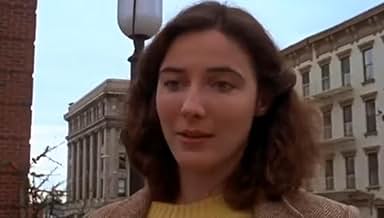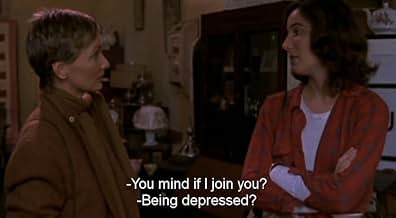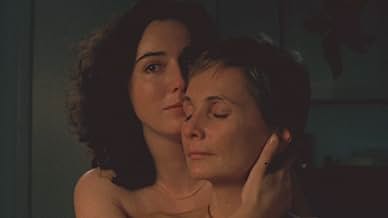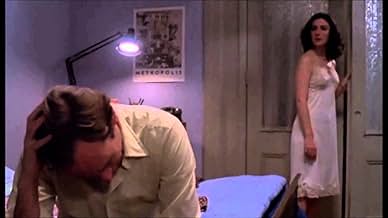VALUTAZIONE IMDb
6,9/10
1897
LA TUA VALUTAZIONE
Aggiungi una trama nella tua linguaA happily married woman comes to realize herself of being a repressed lesbian after she has an affair with a female college professor, and then tries to come to terms with her newfound lifes... Leggi tuttoA happily married woman comes to realize herself of being a repressed lesbian after she has an affair with a female college professor, and then tries to come to terms with her newfound lifestyle.A happily married woman comes to realize herself of being a repressed lesbian after she has an affair with a female college professor, and then tries to come to terms with her newfound lifestyle.
- Regia
- Sceneggiatura
- Star
Jessica MacDonald
- Theda
- (as Jessica Wight MacDonald)
Recensioni in evidenza
10bj_lucky
John Sayles' ability to get you acquainted with his characters shines again in this study of a wife and mother who is coming to terms with her sexuality. Unlike the tawdry stories that focus solely on the sexual aspect of lesbian relationships, Sayles explores and reveals the complexity of discovering homosexual orientation - what it means to Lianna as her sexuality emerges from repression and what it means to her and others that she chooses to live truthfully with it.
There are some very rare vignettes in this film that bely what it is like to discover the attractiveness of women for the first time. Sayles does such a masterful job at portraying this process of discovery - it is joyful, playful, and exciting. These scenes remind me of Truffaut's "The Man Who Loved Women" (also badly remade in the USA, starring Burt Reynolds), but they seem to have a more natural depth and feel. Sayles' movies are typically populated with real characters, not posing movie stars. This film is true Sayles...so much is at stake for Lianna, and you are drawn into the aspects and dimensions of her life, the complexities and facets of the human sexual nature and of life in general, and what it means to come to terms with being gay.
There are some very rare vignettes in this film that bely what it is like to discover the attractiveness of women for the first time. Sayles does such a masterful job at portraying this process of discovery - it is joyful, playful, and exciting. These scenes remind me of Truffaut's "The Man Who Loved Women" (also badly remade in the USA, starring Burt Reynolds), but they seem to have a more natural depth and feel. Sayles' movies are typically populated with real characters, not posing movie stars. This film is true Sayles...so much is at stake for Lianna, and you are drawn into the aspects and dimensions of her life, the complexities and facets of the human sexual nature and of life in general, and what it means to come to terms with being gay.
10zetes
Sayles' second feature as director, and his first great film. It's not perfect, has its share of clichés and is certainly dated, but it's wonderful. Linda Griffiths stars as Lianna, a young mother of two who is constantly suffering under her smarter, controlling husband, a film professor (Jon DeVries). Lianna doesn't have much of a life, but she manages to sneak in a night class twice a week. She develops what seems to be a non-romantic crush on her professor (Jane Hallaren). When her husband cheats on her, the relationship with her professor changes to a sexual one. It would be easy to hold the fact that Sayles is a man against the movie. However, Sayles does here what he does best: create strong, identifiable characters for whom we care. Lianna is really one of the best developed characters I can remember. I absolutely love the way Sayles makes her intellectually inferior to both her husband and lover. It gives her struggle a lot of weight. And I love the line she says to her husband: "Just because you can argue better doesn't mean you are right." She breaks my heart. The power structure between her and her husband is brilliantly written. I also liked that Sayles creates a new power structure, and not one wholly different from the marriage, between Lianna and her lesbian lover. My only complaint is that Sayles does sometimes treat Hallaren's character too kindly. She's clearly taking advantage of Lianna, and at times she's clearly treating her badly. In fact, the relationship starts exactly the same way as the relationship between Lianna and her husband. She was once his student, as well. The parallel isn't underlined as well as it should have been. I think Linda Griffith's performance here is one of the best ever. It's a tragedy that she didn't become famous after this. I know that Sayles isn't the greatest director (specifically referring to the direction) in the world, but this is some of his best work on that front (his very best is certainly Matewan). Of course his greatest talent is his writing; he is such a remarkable writer of human interrelationships. Sayles also gives his best performance as an actor in this film. Lianna is such a subtle work of human emotion. It really doesn't have any big moments, and it doesn't end with any clear resolution. The film's power only hit me about 20 minutes after it was over. It's a small masterpiece.
The previous review did a great job in outlining the movie.
One additional comment: This movie joints "Desert Hearts" and "If these walls could talk 2" in the pantheon of movies with the best romantic scenes between women.
One additional comment: This movie joints "Desert Hearts" and "If these walls could talk 2" in the pantheon of movies with the best romantic scenes between women.
I think if you are interested in the subject matter, the content of the movie carries it. The comments thus far have been extremely positive, which is not quite in line with the current rating. So my comment would be to warn you that there is a lot of mediocre acting and the photography was not great. I'm sure the budget of the movie had a lot to do with it. And in some way the lack of great lighting, etc., and the "lameness" of the movie tends to work in its favor to present the subject matter as very ordinary, very commonplace, in opposition to how society wants to view this as something very unusual. I'm not a long-winded person. The need to pad this out to meet an IMDB requirement of ten lines would seem to ensure that there will be a lot of filler in these comments.
Writer/director John Sayles went with this film where few other directors would have dared to venture at that time. His Lianna is a film dealing with the coming out of a young woman in the midst of a failing marriage. Lianna is a 33 year old woman married to a self-centered college teacher and mother of two children. Though her family does not seem to greatly prosper, it would appear on the surface that Lianna lives a comfortable life. Just when her husband pushes things too far, Lianna starts up a sexual relationship with her night school teacher. Lianna cares enough for this woman that she becomes openly gay, and moves out of her home. She quickly learns that her coming out may cause more problems than she originally bargained for.
First of all, she is forced to live in a tiny apartment and financially support herself. The job market of this college town seems weak, and there isn't much out there in terms of decent employment. As one might expect, Lianna's children are somewhat alienated by their mother's new lifestyle. Their father no doubt helps further the alienation. Lianna's best friend no longer wishes to speak to her. And perhaps worst of all, the woman she came out for, does not wish to be committed to her. She has another woman in another town she is still very much in love with. The rest of the film deals with Lianna coming to terms with her new lifestyle, and trying her best to fight off her sudden loneliness and isolation.
John Sayles, who even plays a supporting part, does a very good job with the material. He had to make this film on a budget of less than half a million dollars, and all of that pretty much came from private donors. The film ends up looking pretty good, but many of the locations are somewhat bleak in appearance. Sayles handles perhaps the most important scene with very good tact. In it, Lianna is trying to come out to Ruth (the teacher) without actually saying it point blank. Ruth is clearly attracted to Lianna, but she obviously fears making a move before she is sure that's what Lianna wishes. Notice how she delicately moves her hand through Lianna's hair as Lianna details a close relationship with a female friend at summer camp. And yes, there are numerous sex scenes. On the surface, this type of film might sound like exploitation, but Sayles doesn't let it slip into that territory. He allows his characters to keep their dignity, and we the audience care deeply about them before its over.
The film is not necessarily about the triumphs and empowerment of coming out. Lianna in fact seems mostly miserable once she allows herself to be honest about her sexuality. That makes this film a somewhat depressing endeavor. Only in the film's final scene is there any sliver of hope that the protagonist can gain acceptance from someone was alienated by her change of lifestyle. The film stumbles a bit in terms of how it handles Lianna's relationship with her husband. He is shown to us as being a truly reprehensible slug from the beginning. I think it would have been more interesting to show him as being either likable or at the very worst simply inattentive. Being as though we already know what a jerk he is, there really isn't any where else the story can go with him. Maybe it would have been more interesting to show how a more typical man would have reacted to his wife coming out. Just a thought.
Overall this is a daring and thoughtful film. Linda Griffiths is particularly outstanding as the title character, and the rest of the cast is fairly convincing as well. The film scores points for dealing with its characters as well-defined individuals, rather than simple stereotypes. If you can find a copy of this little-known film, by all means give it a look. 8 of 10 stars.
The Hound.
First of all, she is forced to live in a tiny apartment and financially support herself. The job market of this college town seems weak, and there isn't much out there in terms of decent employment. As one might expect, Lianna's children are somewhat alienated by their mother's new lifestyle. Their father no doubt helps further the alienation. Lianna's best friend no longer wishes to speak to her. And perhaps worst of all, the woman she came out for, does not wish to be committed to her. She has another woman in another town she is still very much in love with. The rest of the film deals with Lianna coming to terms with her new lifestyle, and trying her best to fight off her sudden loneliness and isolation.
John Sayles, who even plays a supporting part, does a very good job with the material. He had to make this film on a budget of less than half a million dollars, and all of that pretty much came from private donors. The film ends up looking pretty good, but many of the locations are somewhat bleak in appearance. Sayles handles perhaps the most important scene with very good tact. In it, Lianna is trying to come out to Ruth (the teacher) without actually saying it point blank. Ruth is clearly attracted to Lianna, but she obviously fears making a move before she is sure that's what Lianna wishes. Notice how she delicately moves her hand through Lianna's hair as Lianna details a close relationship with a female friend at summer camp. And yes, there are numerous sex scenes. On the surface, this type of film might sound like exploitation, but Sayles doesn't let it slip into that territory. He allows his characters to keep their dignity, and we the audience care deeply about them before its over.
The film is not necessarily about the triumphs and empowerment of coming out. Lianna in fact seems mostly miserable once she allows herself to be honest about her sexuality. That makes this film a somewhat depressing endeavor. Only in the film's final scene is there any sliver of hope that the protagonist can gain acceptance from someone was alienated by her change of lifestyle. The film stumbles a bit in terms of how it handles Lianna's relationship with her husband. He is shown to us as being a truly reprehensible slug from the beginning. I think it would have been more interesting to show him as being either likable or at the very worst simply inattentive. Being as though we already know what a jerk he is, there really isn't any where else the story can go with him. Maybe it would have been more interesting to show how a more typical man would have reacted to his wife coming out. Just a thought.
Overall this is a daring and thoughtful film. Linda Griffiths is particularly outstanding as the title character, and the rest of the cast is fairly convincing as well. The film scores points for dealing with its characters as well-defined individuals, rather than simple stereotypes. If you can find a copy of this little-known film, by all means give it a look. 8 of 10 stars.
The Hound.
Lo sapevi?
- QuizJohn Sayles had written the screenplay for this film before writing the screenplay for his debut film, Return of the Secaucus Seven (1980). Sayles failed to get funding for a film about a lesbian love affair in the 1970s, and those who felt comfortable with the material were not comfortable with the film being directed by a man. So, Sayles put the Lianna: un amore diverso (1983) screenplay on hold until gaining success with his two first films, Return of the Secaucus Seven (1980) and Promesse, promesse (1983).
- Curiosità sui creditiThe opening credits credit only the production company and the crew members. The cast is not credited until the end credits. The title of the film, LIANNA, appears as the last title card after John Sayles is credited as writer, producer, director and editor.
- ConnessioniFeatured in Lo schermo velato (1995)
I più visti
Accedi per valutare e creare un elenco di titoli salvati per ottenere consigli personalizzati
- How long is Lianna?Powered by Alexa
Dettagli
Botteghino
- Budget
- 300.000 USD (previsto)
- Lordo Stati Uniti e Canada
- 1.530.839 USD
- Lordo in tutto il mondo
- 1.530.839 USD
Contribuisci a questa pagina
Suggerisci una modifica o aggiungi i contenuti mancanti

Divario superiore
By what name was Lianna: un amore diverso (1983) officially released in Canada in English?
Rispondi
























